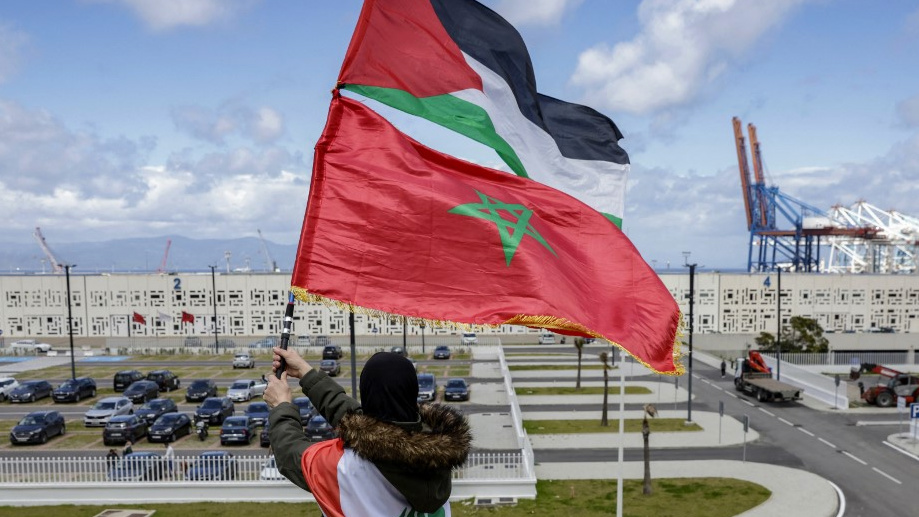The arrival of Israeli Golani Brigade forces in Morocco for the African Lion 2025 military drills has triggered political shockwaves across North Africa.
It is not simply the military presence of a foreign power, but rather the symbolic weight of hosting a unit accused of war crimes in Gaza that has crystallised widespread anger among Moroccan citizens.
Since the Abraham Accords, Morocco has increasingly aligned with Israeli and US interests in the military, intelligence and surveillance domains.
This normalisation has been framed by the regime as a strategic imperative to counterbalance Algeria and bolster its position in the Western Sahara. Israeli military expertise – especially in drone warfare and desert surveillance – is seen as key to gaining an operational edge over the Polisario Front.
But this pursuit of strategic depth comes at the cost of a widening legitimacy gap. Morocco’s monarchy traditionally draws its legitimacy from religious symbolism, historical continuity, and the perception of national unity. By openly embracing Israeli forces – particularly units like Golani – the regime risks alienating wide swaths of the population and undermining its own national narrative.
New MEE newsletter: Jerusalem Dispatch
Sign up to get the latest insights and analysis on
Israel-Palestine, alongside Turkey Unpacked and other MEE newsletters
The paradox lies in the regime’s calculation: by asserting sovereignty and strategic relevance externally, it is eroding the foundations of consensus and cohesion internally.
Why does the regime persist in this strategy, despite visible discontent? Rabat’s logic appears to rest on several intertwined factors, including geostrategic utility, particularly with regards to the military and technological benefits it can gain from partnering with Israel; western endorsement, including a pathway to preferential access to US and European military and security frameworks; and controlled pluralism, or the belief that dissent can be managed without fundamental policy changes. Normalisation is also viewed as another way to undermine the influence of Algiers.
Moral outrage
This strategy, however, looks like a high-stakes gamble. The government is trading symbolic legitimacy for strategic gains, at the risk of political implosion.
The monarchy appears to believe that the political system can absorb the current tensions without fundamental destabilisation, and that over time, normalisation will become an accepted – if not popular – aspect of Moroccan foreign policy.

The Gaza war has not distanced Morocco from Israel, quite the opposite
Read More »
But this approach has inherent vulnerabilities. If protests escalate beyond the regime’s capacity to manage them, or if the promised strategic benefits fail to materialise visibly, Rabat could face a scenario where it has sacrificed popular legitimacy without securing compensatory advantages.
The sustainability of this strategy ultimately depends on whether the regime can deliver tangible national gains that justify the controversial alliance in the eyes of ordinary Moroccans.
The eruption of protests in cities such as Rabat, Casablanca, Fez and Tangier – despite tight restrictions on political expression – shows that Moroccan civil society retains significant mobilising power. The Moroccan Front for the Support of Palestine and Against Normalisation, a coalition of political parties and activist groups, has emerged as a key actor articulating public outrage and framing normalisation as betrayal.
Yet the scope for meaningful impact remains constrained by several structural factors. Coverage of protests is limited in official Moroccan media, reducing national visibility and coordination. In addition, protest leaders often face arrest or surveillance, while other movements are fragmented or absorbed into the regime’s orbit.
Thirdly, there is a lack of political alternatives. With opposition parties marginalised or delegitimised, no cohesive political force has emerged to effectively challenge the monarchy’s foreign policy direction.
Despite these limitations, the ongoing mobilisation may plant the seeds for longer-term transformations. The moral outrage sparked by Israel’s war on Gaza – and magnified by the visible presence of Israeli troops in Morocco – has created a transnational consciousness that connects local struggles with broader global injustices.
Potential trajectories
The Moroccan monarchy’s embrace of military cooperation with Israel thus stems from a complex calculus that prioritises territorial sovereignty, regional competition with Algeria, and integration into western security frameworks. The regime appears willing to absorb significant domestic dissent to advance these strategic objectives, determining that the concrete benefits of normalisation outweigh the costs to its symbolic authority.
The sustainability of this approach remains questionable. The unprecedented nature of current protests suggests that the Palestinian cause transcends Morocco’s managed pluralism, touching core aspects of national identity that cut across ideological divides.
The Moroccan regime’s deepening alliance with Israel is not just a foreign policy shift; it is a rupture in the symbolic contract that binds state and society
The regime’s traditional tools for managing dissent – limited concessions, targeted repression and narrative control – face increasing challenges in an environment where a concrete Israeli military presence provides a visible rallying point for opposition.
Going forward, several potential trajectories emerge. The regime may successfully contain dissent and gradually normalise security cooperation with Israel as a fait accompli, effectively relegating opposition to marginalised political spaces.
Alternatively, sustained pressure could force a recalibration towards less visible forms of cooperation, maintaining strategic benefits while reducing symbolic provocations.
In a more volatile scenario, the legitimacy crisis could deepen if regional conflicts escalate and Moroccan forces become even indirectly associated with Israeli military actions.
Morocco’s strategic gamble has fundamentally altered both its regional positioning and internal political dynamics. By prioritising militarised realpolitik over the emotional and ideological resonance of the Palestinian cause within Moroccan identity, the monarchy has initiated a transformation whose full implications may not become apparent for years to come – and it could have significant consequences for stability and governance throughout North Africa.
The Moroccan regime’s deepening alliance with Israel is not just a foreign policy shift; it is a rupture in the symbolic contract that binds state and society. Whether the monarchy can sustain this posture without provoking deeper domestic instability remains an open question.
The views expressed in this article belong to the author and do not necessarily reflect the editorial policy of Middle East Eye.

